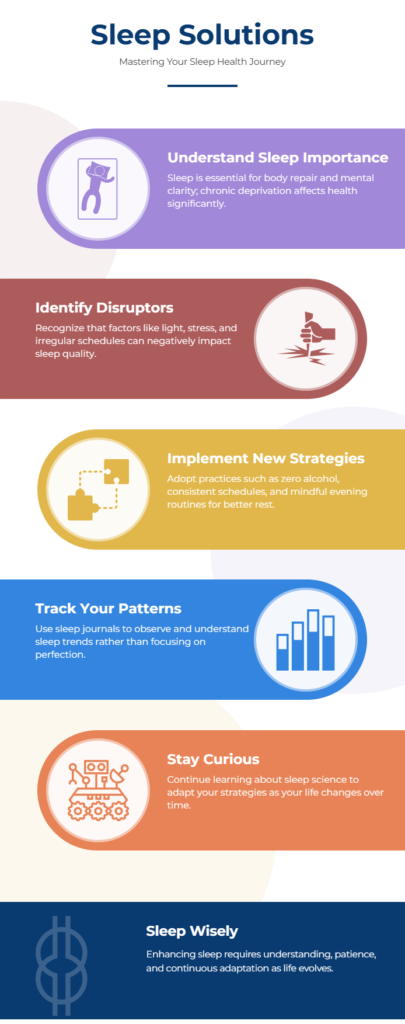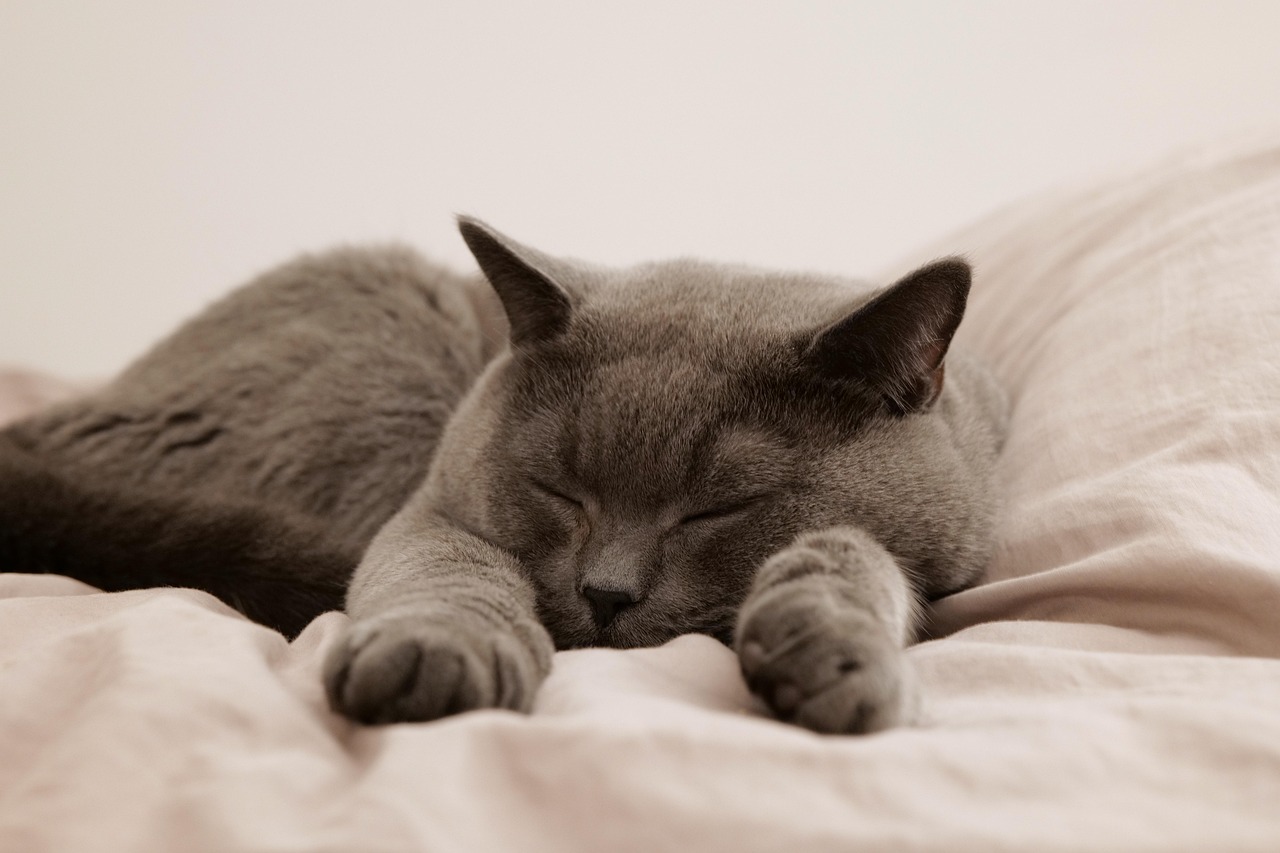Don’t miss a post. Click here to sign up for our free newsletter.
Estimated reading time: 7 minutes
Sleep Right
We wrote about sleep some time ago. And yet, here we are again. Because when it comes to sleep, we can’t say it often enough: it’s the foundation of everything.
Sleep isn’t just when we “turn off” for the night. It’s when our body repairs, our brain sorts through the day’s chaos, our emotions stabilize, and our muscles rebuild. It’s when our willpower recharges, our metabolism resets, and our immune system gets to work like a diligent night shift.
Put simply: if you want to feel good, look good, and perform well, sleep is non-negotiable.
Yet, sleep remains one of the most challenging habits to master.
Why? Because it’s invisible until it’s broken. We often don’t notice how poor our sleep is until it starts cascading into other areas—foggy brain, snapping at loved ones, cravings for junk food, stalled progress in our workouts, or even feeling unmotivated to do the things we love.
And here’s the frustrating part: even when we know sleep is essential, it’s still tricky to fix. There are dozens of small, invisible factors working against us every night. But the good news is—there are things we can do. With patience and curiosity, sleep can get better. It took me months to shift my sleep from “okay-ish” to “pretty solid most nights.”
This post is an invitation to re-examine sleep through a fresh lens—updated recommendations, some recent science, and practical tips that might finally work for you.
Sleep: Still the Underrated Superpower
Let’s zoom out.
A groundbreaking 2017 meta-analysis published in Nature Reviews Neuroscience highlighted how sleep affects literally every major system in our body—cardiovascular, metabolic, cognitive, and immune functions.
Sleep isn’t a luxury; it’s a biological need, like food and water. Chronic sleep deprivation is now linked to:
- Increased risk of obesity, diabetes, and cardiovascular diseases.
- Hormonal imbalances (like ghrelin and leptin) that drive hunger and cravings.
- Impaired emotional regulation (hello, overreactions and burnout).
- Reduced decision-making and self-control (making it harder to stick to health goals).
But here’s something many still don’t know:
Even modest sleep deprivation (getting 6 instead of 7-8 hours) over just a week can have similar cognitive impairments as pulling an all-nighter.
A 2003 study in Sleep found that participants who slept 6 hours per night for 14 days performed as poorly on attention and reaction tests as those who were awake for 24 hours straight.
Ouch.
Why Sleep is Hard to Hack
In theory, sleep sounds simple. – In practice, it’s messy!
Unlike exercise or diet, sleep is influenced by hundreds of subtle, interwoven factors—light, noise, room temperature, stress, social habits, hormones, even the stories we tell ourselves about sleep.
We can’t “white-knuckle” sleep. It doesn’t respond to brute force or “hacking.” The more you try to will yourself to sleep, the more elusive it becomes.
That’s why I often remind myself (and my coaching clients): sleep is a process of gentle cultivation, not control.
It’s the art of setting the stage for our bodies and minds to do what they’re naturally designed to do.
Let’s break down some updated strategies that can help make that process smoother.
Your Sleep Checklist: What Actually Works
1. Zero Alcohol at Night
This might be the single most impactful (and hardest for some) change. Alcohol sedates you, but it doesn’t give you real sleep.
It suppresses REM, fragments your cycles, and leads to early awakenings. Even small amounts (1-2 drinks) can significantly reduce sleep quality.
Pro tip: Experiment with an alcohol-free evening for a week. Notice if your sleep feels deeper, if you wake up less often, or if you feel more refreshed in the morning.
2. Light Dinner, Early Dinner
Big meals close to bedtime make your digestive system work overtime when it should be resting.
Aim for your last meal to be at least 3 hours before bedtime. If that’s unrealistic, at least make it a light, easy-to-digest snack.
3. Consistency is King (and Yes, Even on Weekends)
This is where most of us trip up. Our bodies love rhythm. Try to go to bed and wake up at the same times—even on weekends.
Why? Because irregular sleep patterns disrupt your circadian rhythm, making Monday mornings feel like jet lag— a phenomenon called “social jet lag.”
Small wins: Start by anchoring your wake-up time. Once that’s established, your bedtime will naturally adjust.
4. Control Your Light (Like a Pro)
We are light-driven beings. Our ancestors rose with the sun and slept after dark. Today, we stare into blue-light-emitting devices until midnight and wonder why we can’t sleep.
Two key actions:
- Morning light: Get outside within the first hour of waking. This anchors your circadian clock and sets you up for better sleep at night.
- Evening dimming: Dim lights 1-2 hours before bed. Use warm-colored bulbs. Avoid screens or use blue-light filters.
Pro tip: If you wake up before sunrise (which most of us do in winter), consider a daylight lamp in the morning.
5. Quiet the Mind Before Bed
Our minds love to race as soon as we lie down. Writing a quick 2-minute journal, jotting down tomorrow’s to-dos, or practicing simple breathwork can help signal to your brain: “You’re off duty now.”
If you tend to wake up at night worrying about something, keep a notebook next to your bed. Write down the thought and gently return to sleep.
6. Track Patterns, Not Perfection
Instead of obsessing over a “perfect” night of sleep, look for patterns over weeks. A simple sleep journal can help you identify triggers, such as late dinners, stressful days, or over-caffeination.
Apps and trackers are fine—but use them as gentle awareness tools, not as a means to judge yourself.
7. Stop Trying to “Catch Up” on Sleep
This is a controversial one, but gaining support in the sleep science community: You can’t truly “bank” or “catch up” on lost sleep. Trying to do so may actually confuse your sleep cycles and make it harder to fall asleep the next night.
If you had a bad night, resist the urge to nap or sleep in. Let your body build a natural sleep drive for the following night.
8. Experiment with Your Sleep Duration
Not everyone needs 8 hours. Some thrive on 7, others need 9.
Find your sweet spot by observing how you feel (not just how long you sleep). Adjust your schedule to consistently hit that number.
9. Catch the Natural Wake-Up Window
Here’s an underrated tip: Our sleep runs in roughly 90-minute cycles.
If you naturally wake up within 90 minutes of your alarm, get up! You likely woke during a light sleep phase—trying to go back to sleep might make you groggy.
Small experiment: Track when you naturally stir and adjust your alarm accordingly. Apps like Sleep Cycle can help, but even a regular journal works.
10. Never Hit Snooze (Seriously)
This might be the hardest habit to break. But when you hit snooze, you confuse your brain and start a new sleep cycle you can’t finish, leaving you more tired.
Instead, when the alarm goes off:
- Get up.
- Drink water.
- Get light on your face.
These three things combined will help shake off grogginess faster than snoozing ever will.
Sleep Science is Evolving—Stay Curious
We still don’t know everything about sleep. New research is challenging old myths (like the rigid “8-hour rule”) and showing how individualized sleep can be.
For instance:
- Chronotype science is gaining traction. Some people are biologically wired to be night owls or early birds. Fighting your natural rhythm can lead to chronic fatigue.
- Microdosing light exposure throughout the day (brief outdoor walks, not just morning sunlight) helps regulate melatonin better.
- Cognitive behavioral therapy for insomnia (CBT-I) is now considered the gold standard over sleeping pills for chronic sleep issues.
The point? Stay curious. Sleep is not static. What worked for you in your 30s might need adjustment in your 50s. Give yourself the grace to experiment.
Let’s Open the Conversation: What’s Your Sleep Struggle?
Sleep is personal. And the more we talk about it, the more we realize we’re not alone in the struggle.
Some questions to spark reflection (and I’d love to hear from you in the comments or via message):
- What’s your biggest sleep disruptor right now?
- Have you tried any unconventional strategies that helped?
- What’s your relationship with sleep—friend, foe, or frenemy?
Let’s make sleep less of a solitary battle and more of a collective experiment. Because when we get sleep right, everything else starts to flow more easily.
👉 Call to Action: Download our Sleep Hygiene Checklist.
Check out The Seven Pillars of Sustainable Health and Wellness, an introduction to our overall wellness coaching strategy.
Subscribe to our free newsletter to receive more health tips right in your inbox, or schedule a free 30-minute 1:1 call for a personal consultation.
Sleep Right | Cheat Sheet

